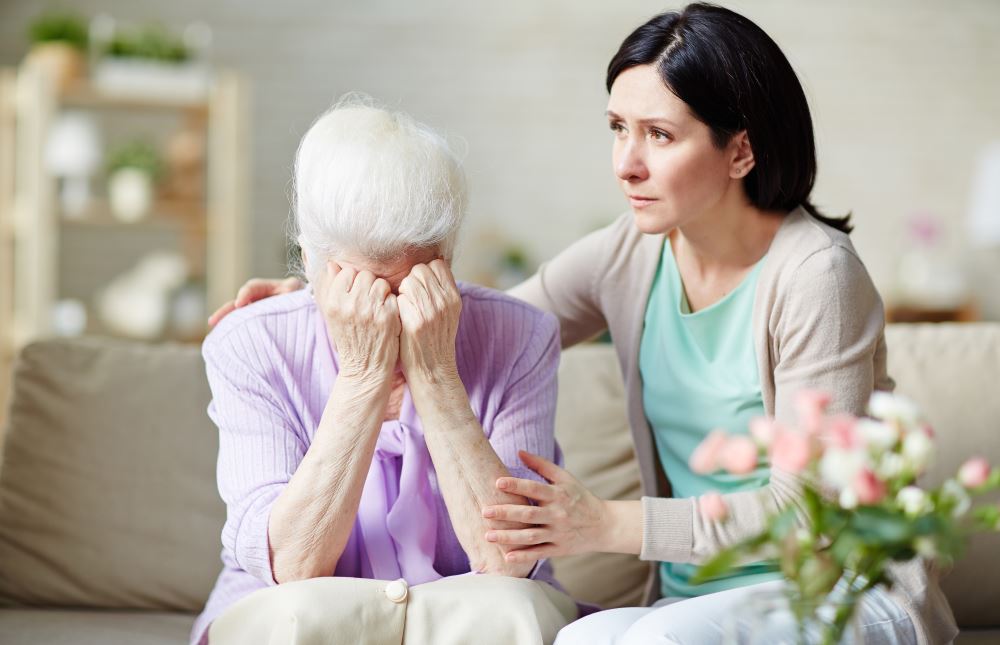Table of Content
Dementia’s later stages often more seriously affect an individual, causing them to need more continual hands-on help with daily living. Exploring options early can help prevent stress and worry when the time comes for a change. Success and accomplishments.Continued learning and achievement can reduce agitation over memory loss and slow the process of cognitive decline, the APA says.

Most of the medicines available are used to treat Alzheimer's disease as this is the most common form of dementia. A new dementia diagnosis in your family can have a significant impact on everyone involved. You and your loved one may have difficulty coming to terms with the emotions, lifestyle adjustments, and expectations that exist with that type of diagnosis. It can allow a person with Alzheimer's or other dementia to stay in his or her own home. Palliative or hospice care teams may be helpful in suggesting ways for people with dementia and their families to connect at the end of life.
Combine Physical Exercise and Cognitive Therapy at Neural Effects
People with a high BMI and the tendency to store fat around their waistline are 3.5 times more likely to be diagnosed with Alzheimer’s disease. The build-up of plaque and tau tangles might be the body’s protective response to chronic inflammation, though the research behind this idea is still developing. This would open up new possibilities to prevent and treat dementia and Alzheimer’s. Women’s Health Group Program The Women's Health Group Program provides the tools and community needed to heal. We created this foundational program to help women balance hormones and address the conditions that result from imbalances.

They only slightly improve dementia symptoms, and only in some dementia patients. The traditionally recognized cause of Alzheimer’s disease is the build-up of beta amyloid plaque and tau tangles in the neurons of the brain. This inhibits communication between nerve cells, which leads to symptoms like memory loss, confusion, and other declines in cognitive function.
In-home care for dementia patients
Monitoring systems can alert you if the person with dementia wanders. A phase 3 clinical trial found that the medicine slowed cognitive decline in people with early Alzheimer's disease by 27%. Lecanemab works by preventing amyloid plaques in the brain from clumping. This study was the largest so far to look at whether clearing clumps of amyloid plaques from the brain can slow the disease. Although primarily used to treat Alzheimer's disease, these medications might also be prescribed for other dementias, including vascular dementia, Parkinson's disease dementia and Lewy body dementia. Simple blood tests can detect physical problems that can affect brain function, such as vitamin B-12 deficiency or an underactive thyroid gland.

Omega-3 supplementation may be helpful in suspending the progression of Alzheimer’s disease. Research shows that dietary restriction increases the numbers of newly-generated brain cells in adults. The implication is that this dietary manipulation can increase the brain’s capacity for plasticity and self-repair.
Importance of advance care planning for people with dementia and their caregivers
Even when someone has dementia, their daily habits can affect how they feel. The same things that are good for their heart and the rest of their body are also going to help their mind -- and their mood. When a parent, partner, or someone else you love gets diagnosed with dementia, you want to do everything possible to help them, including their memory, thinking skills, mood, and behavior. Limiting caffeine, discouraging napping and offering opportunities for exercise during the day might ease nighttime restlessness.

Science has proven that just after 3 months, the memory cell activity of those who practice regularly is equivalent to the memory cell activity of people who younger than them. This important factor helps the brain to receive and process information faster, thereby improving memory in the long run. Only when you have a healthy body will you be able to absorb and process information. Regular exercise increases blood flow and oxygen supply to the brain, thereby helping to prevent dementia. With declining cognitive abilities, Alzheimer’s patients can find new ways to communicate with caregivers through various sensory activities. Dance is a low impact physical activity that gives patients a sensory experience.
Natural Alzheimer’s Treatment #3: Social Interaction
Our dedicated Caregivers receive thorough training, ongoing support from our care managers and continued education to maintain and advance their skills. All caregiving services are supervised by a care manager assigned to oversee and assess each unique client. Research has found that a close caregiver relationship may be more beneficial than medication for loved ones with dementia. But home care isn’t always easier —caregivingoften falls on the shoulders of family members and friends. And these well-meaning loved ones can burn out without the proper support, experts warn.
There are people who have been addicted after several drug trials. Once the body has become accustomed to these substances, they gradually lose their good habits. In addition to physical and psychological problems, abuse of drugs can lead to memory impairment as these substances affect the hippocampus and part of the brain that is responsible for cognitive function. Side effects of medications used to alleviate dementia symptoms include nausea, dizziness, vomiting, slowed heart rate and diarrhea. A doctor or healthcare professional can prescribe the medication that best fits an individual's condition and situation. The fact that levels of CoQ10 decrease with age make it a good candidate to help dementia patients.
Playing brain-stimulating games such as crossword puzzles, Sudoku, calculating, logical puzzles or chess on a regular basis is a way for the brain to always function. If you already own a smartphone, download instant brain training apps with a simple game. Scientists have found that compared to non-gamers, regular gamers have an increased gray area – where the cells of neuronal cells reside. This growth occurs in the Hippocampus.As you know, this is really good for patients with dementia. Nutritionists also recommend one to two glasses of red wine a day as red wine improves memory considerably. Alcohol also dilates the blood vessels, promoting blood circulation.
This approach — which we offer at our clinic, Neural Effects — is an evidence-basedway to influence cognition and behavior positively in early-stage dementia. Day programs, or aduly daycares, are places that care for a group of elders, often with varying degrees of dementia, for a fee. These programs generally run for the length of a full day, or half of a day, and provide all means and supplies that would be needed to care for the elders as well as entertain them. Research into these programs shows benefits for caregivers and those with dementia alike, as well as for those living in nursing homes. Studies indicate that DHA supplementation may be helpful in suspending the progression of Alzheimer’s symptoms.
Behavioral therapy involves tackling the triggers or causes of unwanted behaviors like aggression or wandering in order to alleviate and provide outlets for these behaviors without medication. For example, a trained caregiver may find that feelings of restlessness or stress cause their patient to wander away from home, and can implement an exercise regimen to manage this restlessness. Music can “touch” the part of the brain where we hold our deepest memories, which is why it’s used as therapy for patients with dementia. This therapy has been shown to improvedisruptive behaviors, reduce anxiety, and generally improve mental health and quality of life for dementia patients. Some studiesfound that people who eat fish on a regular basis experience a slower rate of cognitive decline and are less likely to have memory loss. Similarly, DHA supplementation can benefit dementia patients, especially during the early stagesof the disease.

“The goal to this type of care is to keep people at home with the highest quality of life for the longest period of time,” explains Havrilla. Gingko is one of the oldest and most trusted natural remedies for dementia and Alzheimer’s. Numerous research studies show that ginkgo is able to increase microdilation and circulation within the brain to boost short-term memory. Ginkgo biloba supplements are some of the most popular herbal remedies for cognitive function in the world. Among home remedies for dementia, gingko is considered the oldest living tree species in the world which is useful besides some shade. The leaf of gingko has been proven to benefit people with cerebral vascular insufficiency, including the signs and symptoms like short-term memory loss.
They also may be able to help identify when someone with dementia is in the last days or weeks of life. Family members could take shifts visiting with them a few days a week. There are also home monitoring devices for elderly adults that families can use. In-home caregivers provide another way to ensure your loved one receives regular, professional in-home help. Keep reading to learn more about the risks and benefits of people with dementia staying at home.

Dementia is not considered a normal part of aging although 1 in 3 seniors suffer from dementia. Dementia is a broad category of symptoms that affect memory, skill, and cognitive decline. Alzheimer’s disease is a specific type of dementia that accounts for two-thirds of dementia cases. Salvia contains calming properties which can help to relieve the symptoms of depression and reduce the agitation. Apart from following above remedies, you should also stick to a healthy eating plan. Vitamin Cis very useful for repairing the functions of the brain, thereby working as a great natural treatment for dementia.

No comments:
Post a Comment